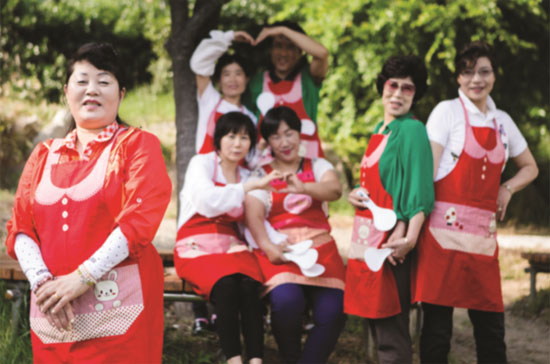Often referred to by her nickname, “the chairman,” North Korean defector Suh Kui Bok is always the first to extend her
hand and greet new people. It’s no surprise mention of her name conjures up
words of appreciation and gratitude by all those who have been touched by her presence at one point in time.
Suh volunteers twice a month for a
volunteer group affiliated with the “House of Peace,” located in the northern district
of Busan. The experience has been so rewarding that she frequently encourages defectors to engage in these activities themselves as part of the settlement process.
“At the beginning everyone may think very
differently, but by working together over time all the volunteers come to unite as one,
laughing along the way; the thing about volunteer work is that it fills your
heart with this indescribable richness. When we finish our work and walk out
the front gate, this feeling surges through us all. Hearing the disabled people we
work with at the home call us “aunty” further fosters that feeling and
keeps us coming back to this place,” she says.
Suh’s first visit to the “House of Peace”
dates back to 2010, a moment she recalls as bringing her some much-needed peace and clarity. Although the pain of leaving her family behind in North Korea remains ever present,
it ebbs bit by bit through the happiness she brings others while volunteering.
Over 70 mentally handicapped individuals
reside in the “House of Peace,” where volunteers are mainly tasked with
organizing, preparing, and cleaning food for these residents to enjoy. Suh
formerly worked in North Korea’s State Security Department kitchen, so the
volunteer work gives her a chance to utilize her expertise here in the
South. Always the first to take the initiative, those who work with her say “she’s so
empathetic she is often in more pain than the victim.”
Starting a second life in South Korea
 Image: Daily NK |
10 years have already passed since Suh
arrived in the South. She set out on the harrowing journey under the pretext of visiting her daughter in
Musan, North Hamkyung Province, but eventually escaping to her sister’s house in
China. However, the path to South Korea was filled with obstacles: Suh was
apprehended and repatriated to North Korea four times before eventually making
it to safety in the South.
“I was beyond ecstatic and overcome with
relief when my feet finally hit the ground in South Korea. If I’d had an easier
time getting here, I probably wouldn’t have been nearly as emotional upon my
arrival. I sobbed when I finally got to Incheon International Airport,” she recalls.
In January of 2005, Suh headed to Busan to
create a new life for herself, but all the difficulties in doing so were
compounded by the relentless pain she experienced being apart from her
relatives, knowing that they were still in North Korea.
Consultation targeting defectors helped her
through some of her darkest times. “The consultant was actually a defector too and therefore able to empathize with me,” Suh explains. This inspired her to invest her
time in comforting defectors like herself, experiencing hardships most others
could hardly imagine, much less relate to.
A new task
Having experienced life in both of the
Koreas, Suh uses much of her spare time to write, hoping that providing
detailed records of her past may be of some assistance to others who have made
the same perilous journey. Her written work even received an award as part of a contest held by the Korea National Police Agency [KNPA]. “Being the type of person who acts before
thinking, I started with the ambition of simply wanting to help other defectors
that were in situations I once was,” she asserts.
To counsel fellow defectors
looking to make their transition to the South as smooth as possible, Suh offers the following advice, “Take a good, deep look inside and then empty yourself of
everything.”
She adds, “You should not be greedy, but rather look for a job that are capable of performing. If you use the experiences you had in the North and put those
to practical use in the South, I believe that you will be able to see positive
change in your life. Maybe you’ll even be inspired to volunteer.”
Naturally, Suh still struggles or feels defeated at
times, but credits her baby as giving her the strength she needs to push through it and work
harder. “I’m really happy with where I am in life right now though, of course,
my scars are still healing. Am I the only one? I mean sure, the situation
might be slightly different in each case, but don’t we all essentially feel the
same? If we want our scars to heal quickly, we must live a life that promotes
that process. I want to play a leading role in helping others in my
situation realize this goal,” she says.
*This article was made possible by support
from the Korea Hana Foundation [the North Korean Refugees Foundation].

















